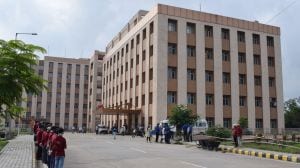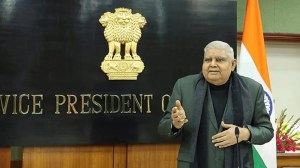In Tamil Nadu budget, a high-stakes mix of welfare, debt and infrastructure in election year
With slew of direct cash transfers and expansion of state-sponsored subsidies, DMK government hopes to reinforce commitment to social security
 In this image provided by DIPR (TN), Tamil Nadu CM M K Stalin with Finance Minister Thangam Thennarasu during the first day of the Budget 2025-26 session at Fort St. George, in Chennai, Friday, March 14, 2025. (PTI Photo)
In this image provided by DIPR (TN), Tamil Nadu CM M K Stalin with Finance Minister Thangam Thennarasu during the first day of the Budget 2025-26 session at Fort St. George, in Chennai, Friday, March 14, 2025. (PTI Photo)Tamil Nadu’s Finance Minister Thangam Thennarasu presented the state budget on Friday, unveiling a Rs 4.39 lakh crore spending plan that blends social welfare with an aggressive infrastructure push. This budget sets the stage for the state’s 2026 Assembly elections. With a slew of welfare measures, direct cash transfers, and expansion of state-sponsored subsidies, the DMK government hopes to reinforce its commitment to social security.
Alongside these populist initiatives, the state outlined ambitious urbanisation plans, including a new “Global City” near Chennai and high-speed transport infrastructure. The budget showcases Tamil Nadu’s balancing act — expanding its social safety net while sustaining economic growth, all against the backdrop of escalating debt and an increasingly fraught relationship with the Union government.
After the DMK government’s firm stance on the bilingual policy and rejection of the three-language formula led to the union government withholding Rs 2,152 crore in education funds, the state has chosen to fund school education independently, increasing allocation to Rs 46,767 crore. This follows the state’s longstanding opposition to Hindi imposition, which has been a politically charged issue in Dravidian politics.
According to the Budget, the state will fund Samagra Shiksha salaries and bilingual curriculum development without the Centre’s assistance.
Also notable was the Budget’s infrastructure push. “In the year 2025-26, roads measuring a length of 6,483 km in all corporations, municipalities and town panchayats in Tamil Nadu will be upgraded at an estimated cost of Rs 3,750 crore,” the Budget states.
Municipal local bodies are allocating additional funds to provide essential infrastructure such as roads, drinking water, street lights, sewage disposal, public transport, education, and healthcare facilities in newly expanded areas to accommodate the growing population, it states.
The Budget cements the DMK’s welfare model, but questions remain about fiscal sustainability given the rising debt burden. The state’s balancing act — between pro-poor policies, industrial growth, and fiscal discipline — will define its economic trajectory in the coming years.
With state debt projected to reach Rs 9.3 lakh crore by March 2026, constituting 26.07% of the Gross State Domestic Product (GSDP), Tamil Nadu remains one of India’s most fiscally stretched economies. The government plans to borrow Rs 1.62 lakh crore this fiscal year while repaying Rs 55,844 crore.
Despite this, revenue expenditure has risen by 9.95% to Rs 3.73 lakh crore, even as capital outlay — crucial for long-term growth — saw a 22.4% increase, reaching Rs 57,231 crore. The state’s own tax revenue is estimated to grow 14.6% in 2025-26, with major collections from commercial taxes (Rs 1.63 lakh crore), stamps and registration (Rs 26,109 crore), motor vehicle taxes (Rs 13,441 crore), and state excise (Rs 12,944 crore).
The budget doubles down on welfare measures, with continued and expanded direct benefits to women, rural communities, and weaker sections. For instance, the Kalaignar Magalir Urimai Thittam (KMUT), under which Rs 13,807 crore is allocated for Rs 1,000 monthly assistance to 1.15 crore women, will now expand to include more beneficiaries. Women’s financial inclusion is further bolstered by a one-percent reduction in property registration fees for assets up to Rs 10 lakh, a move expected to encourage more female asset ownership.
Additionally, the government has unveiled a Women Entrepreneurship Development Scheme, offering bank loans of up to Rs 10 lakh with a 20% subsidy. The Rs 225 crore allocation aims to elevate one lakh women as entrepreneurs over five years. Meanwhile, the fare-free bus travel scheme (Rs 3,600 crore) continues to be a cornerstone of Tamil Nadu’s gender-focused policies, now benefiting 50 lakh women daily.
The budget expands pensions for widows, the elderly, and the disabled, and provides Rs 2,000 to 50,000 orphaned children. It also provides Rs 1,000 monthly assistance to girl students continuing higher education. The Tamizh Pudhalvan Scheme extends the same Rs 1,000 benefit to boys, marking a new gender-equitable shift in student incentives.
With one of India’s fastest-growing urban populations, the state budget is also making a major infrastructure push, with a Rs 2,423 crore “ring main” pipeline project to resolve Chennai’s water distribution challenges and expansion of metro rail networks.
The government also announced the development of a “Global City” near Chennai – a 2,000-acre smart urban hub featuring IT parks, fintech zones, research hubs, and modern public infrastructure.
Additionally, it has outlined a Rs 500 crore roadmap for Anna University to break into the top 10 Indian institutions and the global QS Top 150 rankings.
A Rs 50 crore Marine Resource Foundation to protect Tamil Nadu’s 1,076 km coastline, a Greater Flamingo Sanctuary to safeguard migratory bird habitats in Dhanushkodi, and Rs 70 crore for CNG conversions of 700 diesel buses to curb pollution were other announcements.
The budget also allocated Rs 7 crore for archaeological excavations, including sites in Keezhadi, Karivalamvanthanallur, and Nagapattinam, as part of the state’s cultural soft power strategy. A deep-sea excavation from Kaveripoompattinam to Nagapattinam aims to uncover Tamil maritime trade with the Roman Empire. A Rs 40 crore bronze statue gallery at Egmore Museum and a Thirukkural translation into 45 languages to reinforce Tamil Nadu’s heritage diplomacy were other announcements made by the state finance minister on Friday.












